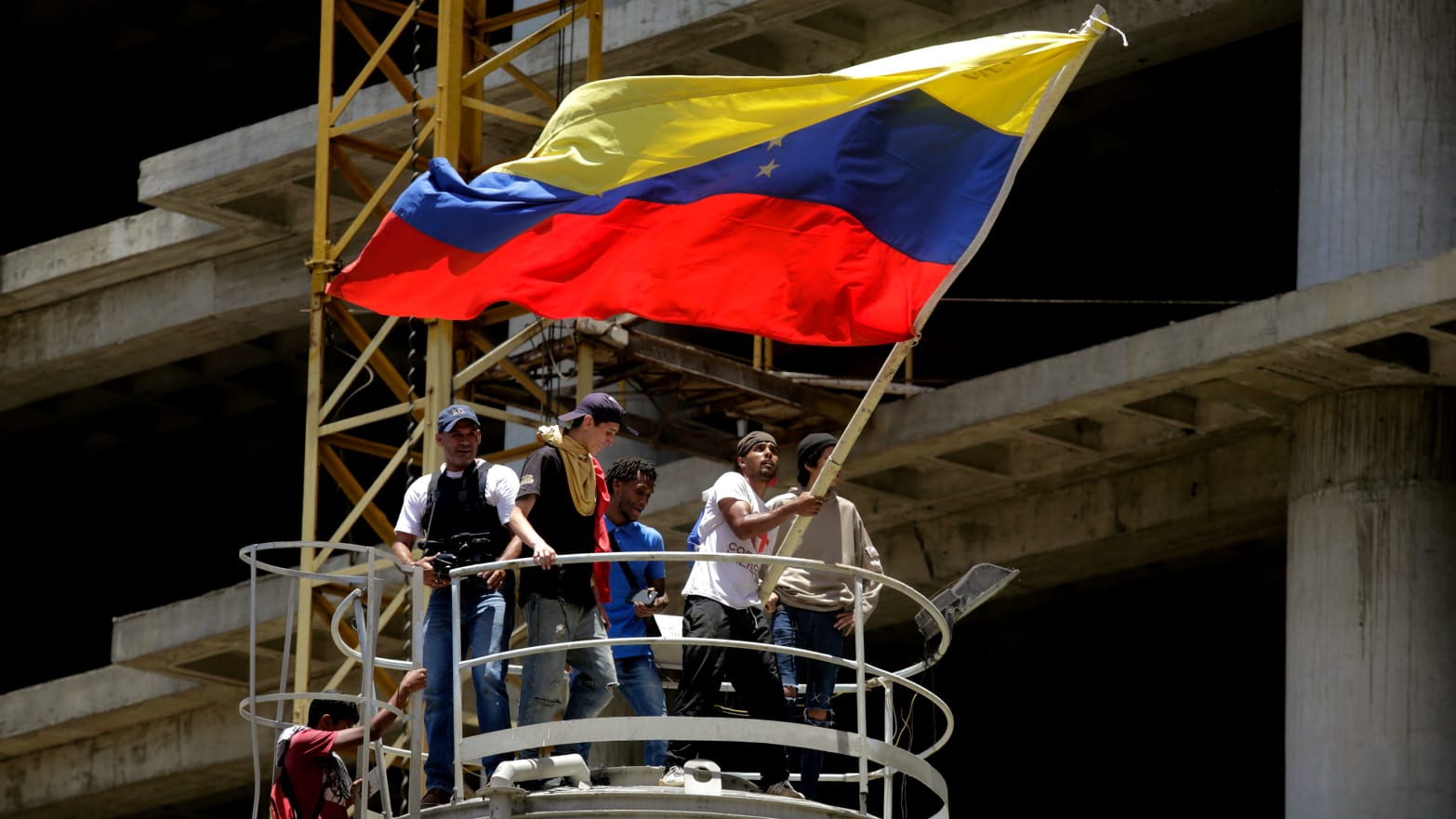It was the scene everyone had waited for.
Juan Guaidó was standing in the street outside La Carlota military airbase, flanked by military that, for once, were there to protect him. By his side was Leopoldo López, founder of the Primero Justicia party and Venezuela’s most famous political prisoner, who had just been released by his military captors.
“This is the final phase of our operation to topple the usurper,” Guaidó said in an impromptu speech released on Twitter early Tuesday morning, but while he was speaking, all eyes were on López, a man many expected never to see alive in freedom again.
“Where is your guard?” a journalist yelled at Lopez, and just off camera a man’s smiling voice can be heard saying, “I’m right here.”
It was a clear sign that something had shifted, and that the promises made by the opposition and its leadership hadn’t been as empty as many Venezuelans had started to fear. For months, Guaidó had hinted at secret negotiations taking place between the opposition and the military, but with every week that passed without any noticeable change, the public support began to waver.
After that initial spark, massive clashes erupted throughout the day in and around Caracas, with paramilitary colectivos out en masse, shooting live rounds at protesters in the streets and military fighting military, creating chaos and uncertainty as to who is on which side.
In WhatsApp videos that The Daily Beast receives in real time from sources on the ground one can see police officers actively helping protesters, switching sides as fights break out outside a central shopping mall in Caracas, and colectivos shooting at both groups as they run for cover.
It is a war zone, only less structured, with no clear sides or definitive allies, and desperate citizens are capturing absolute carnage on their cellphones, filming armored vehicles running over protesters and paramilitaries beating down the uprising.
One of the main questions now is if a violent and bloody suppression of these protests would trigger a foreign intervention, but given the lack of support for such a drastic measure, that seems unlikely. Omar, one of the protesters The Daily Beast spoke to earlier Tuesday, said it would take a catastrophe to make the world react.
“I know it sounds cold, but I think that it would take a Tiananmen Square situation to get the U.S. or the E.U. to step into this mess,” he said. “A lot of people have to die, and die publicly and violently, for the rest of us to be saved.”
As for the reactions from the outside world, they are currently following the expected lines. The European Union released a statement Tuesday urging restraint and calling for free elections, but there was no mention of whether it supported or rejected the opposition’s attempt to oust President Nicolás Maduro.
In the U.S., individual lawmakers have been, while moderate in their language, more clearly in support of Guaidó. Sen. Jim Risch (R-ID), chairman of the Senate Foreign Relations Committee, stated on Tuesday that “Guaidó is the lawful president,” and Sen. Bob Menendez, the top Democrat on the Senate Foreign Relations Committee, placed the responsibility for an escalation with Maduro.
“The only person who can make this violent is Maduro, and the 20,000-30,000 human security agents who don’t belong in Venezuela and should be back in Cuba, and the criminal thugs that have been released from prisons to be used by Maduro against his people,” said Menendez. “Only he can make it violent.”
From within the Trump administration, the anti-Maduro rhetoric has been fiery from the start, with Secretary of Defense Mike Pompeo and National Security Advisor John Bolton leading the charge. In an interview with CNN on Tuesday, Pompeo claimed that the Venezuelan government was crumbling and that President Maduro himself had been preparing to flee to Cuba but was talked out of it by Russian advisors. Pompeo did not provide sources for this extraordinary claim.
John Bolton spoke along similar lines when giving his comments on the escalation of the Venezuelan crisis, saying that former Maduro allies were ready to turn:
"We think it's still very important for key figures in the regime who have been talking to the opposition over these last three months to make good on their commitment to achieve the peaceful transfer of power."
While Maduro has yet to make a statement since the clashes broke out, Diosdado Cabello, the president of Venezuela’s Constitutional Assembly, has made several. In a radio address, he called upon all colectivos to prepare to defend Miraflores, the presidential palace, and to strike down anyone who tries to destroy the Bolivarian Revolution started by the late Hugo Chávez.
“This coup d’état has failed,” he said, but given that the government is now mobilizing military and paramilitary troops at Miraflores, that seems to be a slight exaggeration.
Although Tuesday night was largely quiet, the dangerous drama of coup and countercoup is expected to continue on Wednesday.
In many of his speeches, Guaidó has spoken about the march on Miraflores, but most have interpreted that as a metaphor, rather than a statement of facts. Such a walk would in all likelihood end in a bloodbath, at least before the bulk of the military has turned, and attempting such an undertaking prematurely could mean walking right into the hands of a much superior opponent, crushing the last hope of an exhausted and impoverished population.
—Sam Brodey contributed reporting from Washington, D.C.

